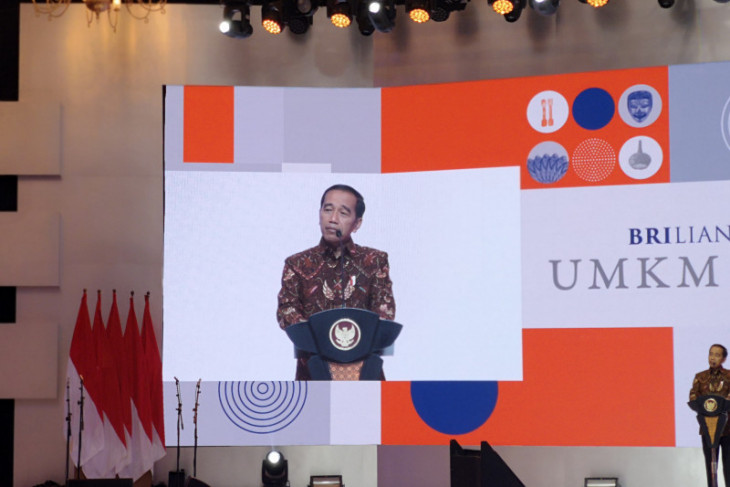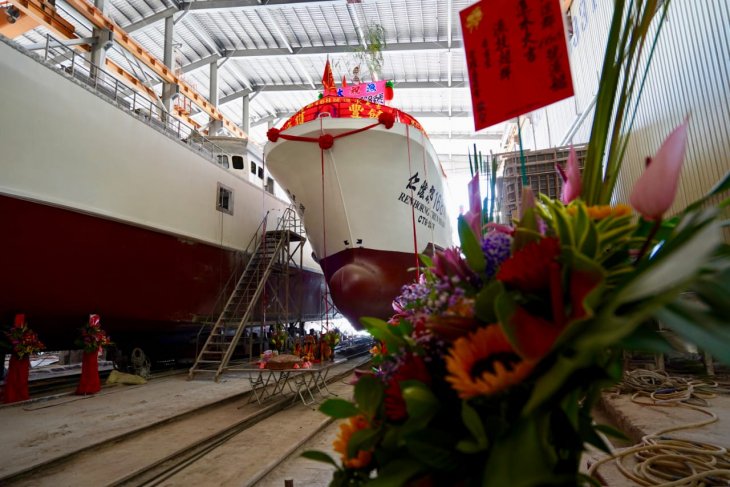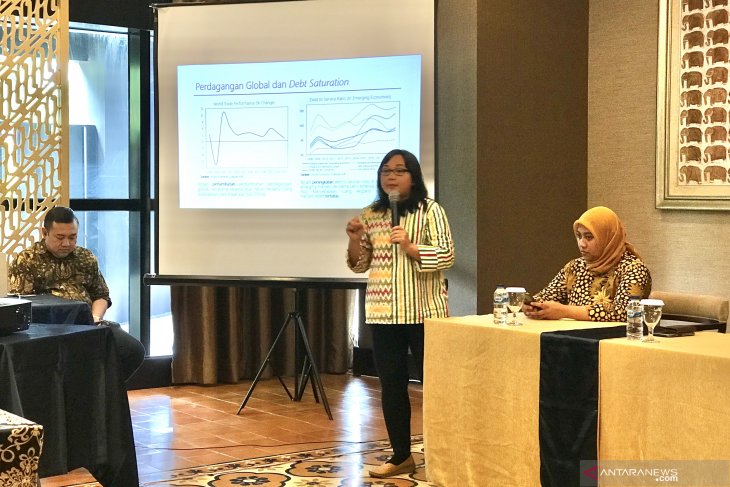Live Streaming
Program Highlight
Company Profile
December
Fishery Ministry, FAO to Develop Low-Cost Pangasius Culture
Written by Ani Hasanah
The Maritime and Fishery Ministry's Aquaculture Director General, Slamet Soebjakto. (ANTARA)
The Maritime and Fishery Ministry and the UN's Food and Agriculture Organization (FAO) will develop a low-cost catfish (Pangasius Sp.) culture in Indonesia after a pilot project in South Sumatra this year yielded positive result.
Under the "Supporting Local Feed Self-Sufficiency for Inland Aquaculture in Indonesia" project, the ministry and FAO will impart training to farmers on the Pangasius culture to become self-reliant in producing low-cost, high-quality fish feed, the ministry's aquaculture director general, Slamet Soebjakto, noted in a statement received here on Monday.
Soebjakto explained that the project, costing US$257 thousand, aims to boost the production of Pangasius in Indonesia, one of the world's largest catfish producers.
"I believe the self-produced, low-cost fish feed will positively contribute to Pangasius production and its efficiency," he stated.
By increasing the yield, Soebjakto expects Indonesia to soon be able to export Pangasius to markets in the Middle East, Europe, Asia, and the United States.
The farmers' self-produced fish feed, made of silage and palm karnel milk, is of the same quality as the factory-made product, Soebjakto pointed out.
Following the positive result of the program's pilot project in South Sumatra, the ministry is looking forward to the FAO offering continued assistance to Pangasius farmers in the country's other regions to self-produce the low-cost fish feed.
"We will introduce this self-produced fish feed to other Pangasius farmers in the country. We expect that the FAO will continue to support the country's aquaculture industry, mainly in terms of providing solutions to deal with future challenges," he stated.
Apart from the FAO, the ministry's director general also prompted local governments to offer financial support to Pangasius farmers by offering at least 10 percent subsidy in the fish feed production cost. (ANTARA)
December
Large-Scale Businesses still Dominate Indonesia's Exports: Jokowi
Written by Ani Hasanah
President Joko Widodo (Jokowi) at the opening of the UMKM Export BRIllianpreneur 2019 in Jakarta on Friday (ANTARA)
JAKARTA - President Joko Widodo (Jokowi) conceded to the fact that large-scale companies continue to play a dominant role in Indonesia's exports.
"I tell you as it is, large-scale businesses yet contribute to exports," Jokowi remarked at the opening of the micro-, small-, and medium-scale entrepreneurs (UMKM) Export BRIllianpreneur 2019 held here on Friday.
The head of state cautioned that such a situation should not daunt SMEs entrepreneurs since the government had continued to take requisite efforts to spur exports by SMEs.
"I am optimistic about the situation improving the other way round. Currently, large-scale firms contributed 85.6 percent to exports. It is okay. It means that the remaining 14 percent is the contribution of SMEs," he noted.
The president believes that varied efforts, comprising those undertaken by the state-run bank PT Bank Rakyat Indonesia (BRI), can drive the exports of SMEs products.
"When I saw products showcased here. I am optimistic that soon these products would flood the export market if we were to consolidate the market and improve the standard of quality of products to compete with other countries," Jokowi emphasized.
President Director of BRI Sunarso emphasized that UMKM BRIllianpreneur 2019, held on December 20-22, aimed at encouraging SMEs to up their ante to penetrate the export market.
"The event witnessed the participation of 155 SMEs under BRI's coaching in fashion, handicraft, food, and beverages," he stated.
Activities during the event comprised a coaching clinic for SME, training in packaging, UMKM Award, barista competition, and business matching between SME and potential buyers, he revealed. (ANTARA
December
Taiwan to Build Modern Fishing Vessels in Indonesia
Written by Ani Hasanah
One of ships produced by Chien Fu Shipbuilding Co, Ltd at the shipyard in Taiwan ( (ANTARA)
Taiwan's Chien Fu Shipbuilding Co, is ready to build modern high-tech fishing vessels made of fiber-reinforced plastics (FRP) in Indonesia in cooperation with two national companies. The two local partners are PT. Indomina Cipta Agung in Semarang and PT. Kelola Mina Laut (KML Food), Director of Administration and Planning Department of Taiwan's Ship and Ocean Industries R&D Center (SOIC) Ming-Hsien Tsan said in an official statement, made available to Antara in Jakarta on Friday.
"Chien Fu has chosen Surabaya, in East Java, as a location for their business in Indonesia and will start their activities next year," Ming said.
SOIC is a Taiwanese marine industry development institute that organized a meeting between Chien Fu and the two Indonesian partners.
Ming explained the reasons behind the planned development of FRP technology vessels which are not only environmentally friendly and reduce the significant use of wood but also offer the same price as those made of wood. Moreover, fiber has a higher level of endurance than wood.
"So FRP (vessels) are far more economical for Indonesian fishermen," he said.
PT. Kelola Mina Laut will send some of its employees to Taiwan for nearly a year to learn the technology and ways to build a fishing vessel weighing 30 to 50 tons, he said.
The dispatch of PT Kelola Mina Laut to Taiwan is aimed at ensuring the smooth transfer of technology, he said.
Indonesia needs the transfer of technology since the Indonesian fishery industry is the biggest in Southeast Asia so that the country has great potential to develop the fishing vessel manufacturing industry, Ming said.
In addition to the great potential in developing the fishery business, Chien Fu Shipbuilding Company's business expansion is also part of Taiwan's New Southbound Policy expected to strengthen cooperation with Southeast and South Asian countries, particularly Indonesia, Ming said.
Established in 1942, Chien Fu Shipbuilding Co, Ltd is one of the leading companies in Taiwan engaged in the fishing vessel construction business. (ANTARA)
December
Indonesia's Economy Relatively Stable Amid Global Recession: Indef
Written by Ani Hasanah

Institute for Development of Economics and Finance (Indef) Program Director Esther Sri Astuti said in a Public Discussion titled End of Year Reflection : Women Economists Watch Out for Global Economic Recession in Jakarta, Friday, 20/12/2019. (ANTARA)
Institute for Development of Economics and Finance (Indef) Program Director Esther Sri Astuti said the Indonesian economy was relatively stable amid the potential for a global recession.
"Why it is relatively stable because the main components that support Indonesia's economic growth are not exports and imports. Because our export-import ratio is only 39.9 percent of the Gross Domestic Product (GDP)," Esther said in a Public Discussion titled End of Year Reflections: Women Economists Watch Out for Global Economic Recession in Jakarta, Friday.
She explained, the main component that sustains Indonesia's economic growth is consumption, which ratio reaches 56 percent of GDP.
So, according to Esther, what the government needs to do next year is to keep the consumption sector running well.
"So, if the government wants to be stable in the future, don't disturb consumption because this is the main component," she said.
Economic growth in several countries has decreased, even the United States which is included in the strong category in terms of economic growth is also slowing due to the global recession.
Germany even experienced negative growth, although the country only grew by 0.4 percent. While China, which normally grows 7 percent, is estimated to only reach 5.5 percent growth until the end of 2019.
Meanwhile, economic growth in Europe, Britain, Japan, and India fell sharply in the range of 5 percent.
Under these conditions, even though Indonesia's growth is relatively stable, it is still considered vigilant. (ANTARA)


